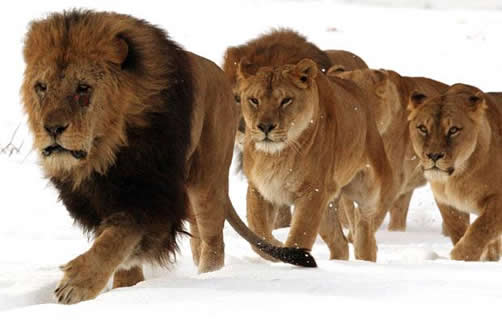Culture is Adaptive

Culture is to people as tooth and claw are to lions.
Culture is a biologically based adaptation to environment.
Humans do not biologically inherit a culture. However, we ARE biologically "programed" to learn the culture around us.
We have a culture instinct.
Next: Biology, energy, evolution
Culture is the fundamental biological adaptation of human beings in the same way that tooth and claw are the fundamental biological adaptations of lions. Culture has the advantage of flexibility but culture also lies in a way that tooth and claw cannot. This means that, as long as lions exist, prey exist, and their environment is stable, lions can depend on tooth and claw. They are what they are and they act dependably to kill prey and allow the lion to eat. Tooth and claw can’t be false. But the same is not true of culture.
Culture is the way we put food into our mouths. It’s our adaptation and it is dependable. However, all sorts of things that are just plain not true can become part of culture and continue on for generations and generations. One relatively innocuous example of this is the fact that for hundreds of years Europeans believed that tomatoes are poisonous (for more on that click this link). A far from innocuous example is that for hundreds of years they also believed that people with certain skin colors were superior to those with other skin colors; a belief that has caused untold misery.
But the fact that beliefs that are objectively wrong get passed down in culture is a feature not a bug. That is, much of culture… and parts of culture that are particularly important to us… consists of beliefs that cannot be objectively derived from our environment and beliefs that may not necessarily work in the sense of providing us with food or security or much else. Many beliefs that we hold dear may make us less secure, less likely to survive.
Lions, subject to the constraints I’ve mentioned will always capture prey with tooth and claw. As far as we know, lions have no sense of beauty, liberty, duty, responsibility, purpose, or anything else like that. They’re just lions (and that’s enough). Humans are exactly the opposite.
Those of you who are kind-of on my wavelength and know who Terry Pratchett was won’t be surprised to hear that I’m a big fan. There’s a quote from a Pratchett book that I think about frequently. Death is a recurring Pratchett character and in this quote, he is talking with his granddaughter Susan Sto Helit. Death always speaks in capital letters. The quote comes from a book called Hogfather, (1996) one of his books that I don’t particularly like. Anyway, the Hogfather is a Santa Claus like character. The Tooth Fairy is also another key character in the book.
“All right,” said Susan. “I’m not stupid. You’re saying humans need… fantasies to make life bearable.”
REALLY? AS IF IT WAS SOME KIND OF PINK PILL? NO. HUMANS NEED FANTASY TO BE HUMAN. TO BE THE PLACE WHERE THE FALLING ANGEL MEETS THE RISING APE.
“Tooth fairies? Hogfathers? Little—”
YES. AS PRACTICE. YOU HAVE TO START OUT LEARNING TO BELIEVE THE LITTLE LIES.
“So we can believe the big ones?”
YES. JUSTICE. MERCY. DUTY. THAT SORT OF THING.
“They’re not the same at all!”
YOU THINK SO? THEN TAKE THE UNIVERSE AND GRIND IT DOWN TO THE FINEST POWDER AND SIEVE IT THROUGH THE FINEST SIEVE AND THEN SHOW ME ONE ATOM OF JUSTICE, ONE MOLECULE OF MERCY. AND YET—Death waved a hand. AND YET YOU ACT AS IF THERE IS SOME IDEAL ORDER IN THE WORLD, AS IF THERE IS SOME…SOME RIGHTNESS IN THE UNIVERSE BY WHICH IT MAY BE JUDGED.
“Yes, but people have got to believe that, or what’s the point—”
MY POINT EXACTLY.”
To make the point far less eloquently than Pratchett, the truths that we care about, the truths that we live and die about are not the truths of tooth and claw, are not the truths of scientific objectivity, they are the truths (or lies) of beauty, love, friendship, identity, duty, belief, and so on... And none of these, absolutely none, are scientific, objective truths. However, the human capacity that lets us devote ourselves to any abstract cause, to our friends, community, nation, or whatever, is the same human capacity that allows us to believe that tomatoes are poisonous or that people's worth can be judged by the color of their skin.
So, how do we differentiate between the lies that lead to horror and the lies that lead to the best of what it means to be a human? I don't know, but I'll leave this bit of writing with a quote from another of my favorite authors, (perhaps unsurprisingly) Kurt Vonnegut, who wrote in Breakfast of Champions (1973):
We are only healthy to the extent that our ideas are humane.
I'll leave it to you to figure out what ideas are and are not humane, but I don't think it's an easy or trivial question and I don't think it's the property of any one group, political or otherwise. I think that it may not be much, but it's all we got.
If you haven't read Pratchett or Vonnegut, here are some books that I'd recommend:
For Pratchett: Small Gods (1992), Night Watch (2002), Mort (1987), and, of course, you might already be familiar with Good Omens (1990) by Pratchett and Neil Gaiman.
For Vonnegut: The Sirens of Titan (1959), Cat's Cradle (1963), Breakfast of Champions (1973), and, of course, you might already be familiar with Slaughterhouse Five (1969).
